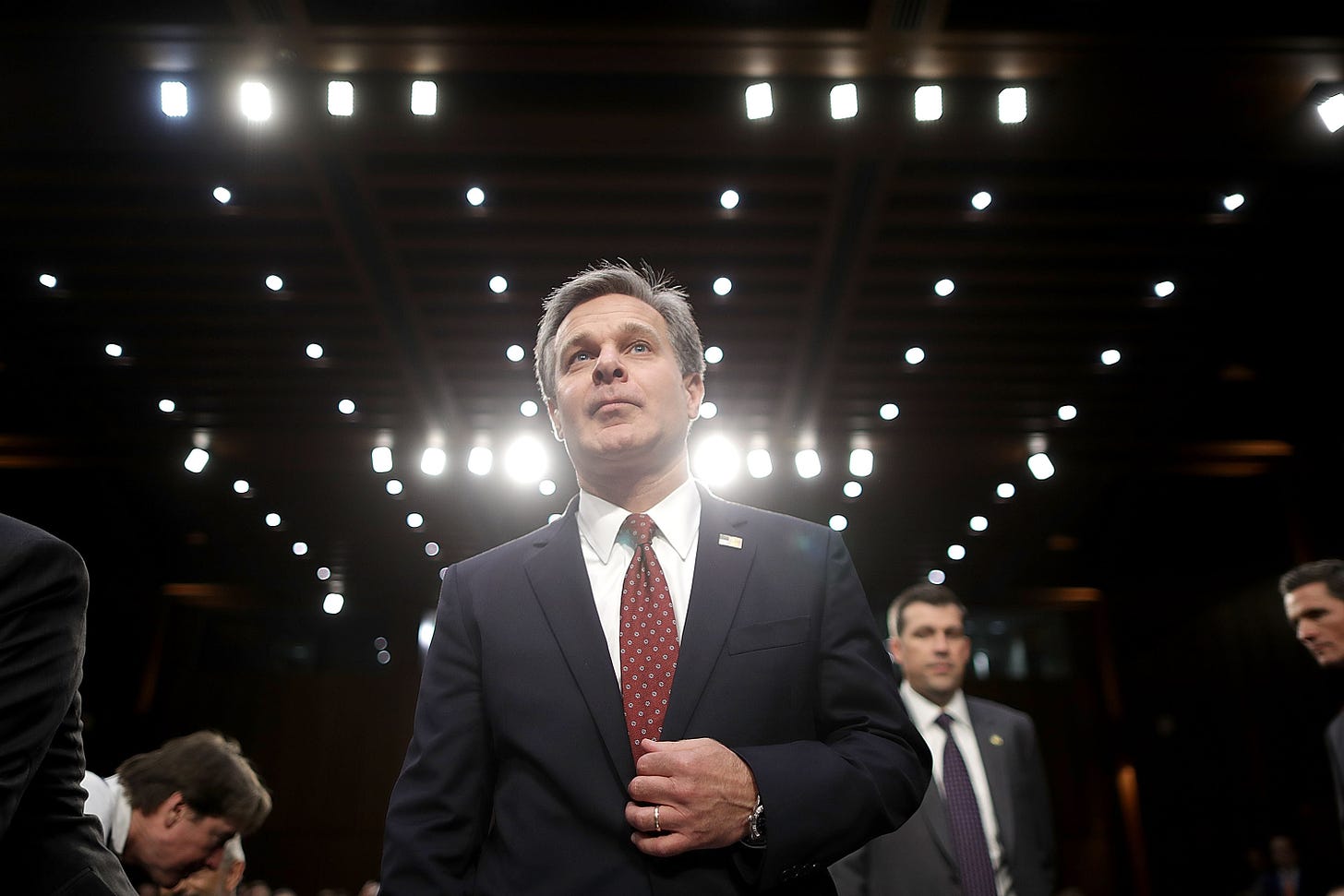
Chris Wray’s Pre-Surrender
Do the people manning our institutions even have the energy to fight?
To nobody’s surprise, Donald Trump has been named Time Magazine’s 2024 Man of the Year. We’re sure he’s thrilled. As part of the process, Trump sat down with the publication and gave us this little chestnut about pardoning the January 6th rioters. “It’s going to start in the first hour. . . . Maybe the first nine minutes.” Man of the Year timber right there.
And hot off the press as we were getting ready to send this newsletter, per the AP: “President Joe Biden is commuting the sentences of roughly 1,500 people who were released from prison and placed on home confinement during the coronavirus pandemic and is pardoning 39 Americans convicted of nonviolent crimes. It’s the largest single-day act of clemency in modern history.” Happy Thursday.

Wray Bows Out
by Andrew Egger
When we look back someday on Donald Trump’s long rampage through our institutions, a question that may haunt us is this: Would those institutions have fared better if they had spent a little less effort trying to maintain their neutrality and a little more effort fighting for their independence?
That question was front of mind yesterday after the surprise announcement from FBI Director Christopher Wray that he would step down at the end of Joe Biden’s presidency, despite having three years left on his 10-year term. “In my view,” Wray told FBI staff in Washington D.C., “this is the best way to avoid dragging the Bureau deeper into the fray, while reinforcing the values and principles that are so important to how we do our work.”
It was, of course, not Wray who was dragging the FBI into the political fray. Trump—the man who nominated Wray in the first place—long ago deemed Wray a deep state enemy for, among other things, permitting the FBI’s search of Mar-a-Lago in what would become part of the classified-documents case against him. (Quick reminder: Trump did have reams of illicit classified materials at Mar-a-Lago, and as Will Saletan reminds us in a piece for the site today, those felony charges were perhaps the most open-and-shut of the many and varied charges Trump faced during his interregnum.)
So Trump decided—decades of precedent of keeping the FBI independent of political influence be damned—that he’d simply fire Wray and replace him with an FBI director more his style. Kash Patel, Trump’s replacement pick, checks every box that matters. He is slavishly devoted to Trump personally, has few prospects outside MAGA world and so couldn’t afford to betray Trump even if he wanted to, and nurses his own burning hatred toward Trump’s foes. As we’ve repeatedly noted, Patel spent years publicly auditioning for the role by going on right-wing podcasts and listing the people he’d like to see prosecuted, the lists of names rolling effortlessly off his tongue.
Wray couldn’t stop Trump from defenestrating him for Patel. But he could have forced Trump to actually go through with the act of firing him. Instead, he judged that the best way to set the FBI up to survive Trump was to ease the handover to Trump’s hand-picked lackey.
As the news broke on Capitol Hill yesterday, Senate Democrats were mostly grim and tight-lipped. “You’d think they’d be more grateful [to Wray],” groused Sen. Sheldon Whitehouse (D-R.I.), “after he tanked the Kavanaugh investigation for them.” Asked by The Bulwark whether Wray’s resignation would make Patel’s path to confirmation smoother, Whitehouse said he didn’t have a comment.
Several Democratic senators said they respected Wray’s decision to go out on his own terms. “It’s very unfortunate; I think he’s done an excellent job,” Sen. Debbie Stabenow (D-Mich.) told The Bulwark. “I think it was clear it was gonna be hard for him to serve a president that didn’t want him to be there.”
“I think he decided that his decision should be his and not waiting around to be fired,” said Sen. Mazie Hirono (D-Hawaii). Sen. Tim Kaine (D-Va.) agreed: “It’s his call to make.”
Others disputed that Wray’s decision would grease the skids for Patel’s likely ascension. “I mean, we’re going to scrutinize that nomination very, very carefully,” Sen. Tammy Baldwin (D-Wis.) told The Bulwark. “I have a lot of concerns about it, but I don’t think this changes the dynamics of—you know, I guess it’s just a matter of timing.”
“I think it’s a distinction without a difference,” said Sen. Richard Blumenthal (D-Conn.), a member of the Judiciary Committee, which will consider Patel’s nomination. “From the standpoint of the need to maintain the independence of the FBI as a law enforcement institution, its objectivity and its independence have to be vigorously defended now more than ever.”
In a nuts-and-bolts way, they’re probably right: Senate Republicans continue to signal they’ll wave Patel on in. Still, it’s a difficult thing to witness. Maybe Wray is right that permitting an orderly and decorous transition to a nakedly Trump-loyal FBI is the best way to preserve the possibility of something calmer and better down the road. But it’s hard to escape the feeling that Wray is just one more person you might expect would push back against Trumpism who’s too tired for the fight—that the FBI is one more institution that’s chosen to comply in advance.

The Probity of the Senate?
by William Kristol
Late yesterday President-elect Donald Trump announced his picks for director of Voice of America. The day before, he made his selection for ambassador to Greece.
For the broadcasting agency charged with providing truthful coverage of the United States to the world, Trump chose the failed candidate for governor and senator from Arizona (and leading election denier) Kari Lake. For ambassador to the land of Pericles and Plato, Trump chose what appears to be the failed candidate for presidential daughter-in-law, Kimberly Guilfoyle.
I suppose we needed a kind of comic interlude from the demoralizing spectacle of the all-too-gentlemanly resignation of FBI Director Chris Wray, and from the apparent willingness by some Republican senators, under Trumpist bullying, to drop their opposition to Trump’s dangerous nominations for FBI director as well as director of national intelligence, secretary of defense, and secretary of health and human services.
I’ll only say for now that I think that willingness may be more apparent than real, and that the conventional wisdom is now too fatalistic in assuming these nominees will all be confirmed. Key Republican senators have preserved plenty of wiggle room to discover new facts about the nominees, or to be shocked at what they say in private meetings or at what comes out at their hearings. Their confirmations are by no means done deals.
Still, it is sad that senators feel unable to say the simple truth: These nominees are manifestly unfit, in terms of their character and qualifications, for the important positions for which they’ve been proposed.
To put this all in perspective, I thought it might be useful to quote a passage from Federalist No. 76, in which Hamilton is defending the constitutional requirement of Senate advice and consent to presidential nominations. It’s worth reading.
To what purpose then require the co-operation of the Senate? I answer, that the necessity of their concurrence would have a powerful, though, in general, a silent operation. It would be an excellent check upon a spirit of favoritism in the President . . .
It will readily be comprehended, that a man who had himself the sole disposition of offices, would be governed much more by his private inclinations and interests, than when he was bound to submit the propriety of his choice to the discussion and determination of a different and independent body, and that body an entire branch of the legislature. . . . He would be both ashamed and afraid to bring forward, for the most distinguished or lucrative stations, candidates who had no other merit than that of coming from the same State to which he particularly belonged, or of being in some way or other personally allied to him, or of possessing the necessary insignificance and pliancy to render them the obsequious instruments of his pleasure. . . .
A man disposed to view human nature as it is, without either flattering its virtues or exaggerating its vices, will see sufficient ground of confidence in the probity of the Senate, to rest satisfied, not only that it will be impracticable to the Executive to corrupt or seduce a majority of its members, but that the necessity of its co-operation, in the business of appointments, will be a considerable and salutary restraint upon the conduct of that magistrate.
Do we see today any evidence of the “silent operation” of Senate confirmation as an “excellent check on a spirit of favoritism in the president?” Perhaps, though there are grounds for doubt. Do we see today a “sufficient ground of confidence in the probity of the Senate?” There are grounds for concern. There may even turn out to be grounds for despair.
But I don’t want to end on a downbeat note in this holiday season. After all, as a contemporary of Hamilton, the Hasidic master Rabbi Nachman of Breslov, teaches us: “It is forbidden to despair.”
Quick Hits
A SWING AND A MISS: With limited time on the legislative clock before Republicans take over, Senate Majority Leader Chuck Schumer is focused on slamming through as many federal-judge confirmations as time permits. Yesterday, though, at the urging of progressives, he spent a chunk of the day gambling on another priority: trying to reconfirm National Labor Relations Board Chair Lauren McFerran for another five-year term.
The confirmation would have been a coup, ensuring Democratic control of the important board for the first two years of Donald Trump’s second term. It didn’t work. Schumer had been gambling that Sens. Kyrsten Sinema (I-Ariz.) and Joe Manchin (D-W.V.) would let McFerran’s nomination through. But Sinema voted no, and Manchin, who had been off-site, came back to the Capitol with the vote tied 49-49 specifically to spike it. With McFerran’s term expiring, Trump will be able to nominate a new member to the board at his leisure, which will give it a 3-2 Republican lean.
WHAT THE ZUCK: Two months ago, Mark Zuckerberg let it be publicly known that he was done with politics. Having been turned into a villain by MAGA for the audacity of funding projects to expand and ensure voting access in 2020, the Facebook founder said he was moving away from funding political causes and reconfiguring his platforms to deemphasize political news.
It turns out, however, that Zuckerberg wasn’t actually done with politics; he was just done with a certain type of politics. Yesterday, the Wall Street Journal reported that Meta would be donating $1 million to Trump’s inauguration. The company made no such donation in 2017 and no such donation for Joe Biden in 2021. The report comes days after Zuckerberg went down to meet with the president-elect at Mar-a-Lago. The Journal reports that the tech tycoon brought a bit of a sweetener to that private patio dinner: “Before the dinner, Zuckerberg did a private demonstration for Trump of Meta’s Ray-Ban smart glasses, which he gifted to the president-elect, the people familiar with the discussions said.”
How much goodwill this is buying Zuckerberg is unclear. Elon Musk, this morning, was already trolling him.
A FIRM HANDSHAKE: Odds are you don’t love anything as much as Rep. Nancy Mace (R-S.C.) loves being in the news. But here’s a new one, even for her: Mace on Tuesday accused a visitor to the Capitol of “accosting” her at an event by shaking her hand “aggressively and in an exaggerated manner” while criticizing her hostile stances on trans issues. James McIntyre of Illinois, part of a foster care advocacy group that was meeting with lawmakers, was booked for a misdemeanor assault charge. Two witnesses told police he “shook her arm up and down in an exaggerated, aggressive hand shaking motion.” Other witnesses, including members of the advocacy group, disputed that characterization: “What we witnessed was a handshake, a passionate shake, but it didn’t look like an assault or intended aggression,” one said.
Either way, Mace spent her Tuesday luxuriating in the incident, wearing a sling around the Capitol and tweeting about it 16 times.


















Hamilton's premise, that a President would be somehow constrained by shame, has not stood the test of time.
See David French in today’s NYTs:
“By stepping down now, as the conservative writer Erick Erickson observed, Wray has created a “legal obstacle to Trump trying to bypass the Senate confirmation process.”
Here’s why. According to the Vacancies Reform Act, if a vacancy occurs in a Senate-confirmed position, the president can temporarily replace that appointee (such as the F.B.I. director) only with a person who has already received Senate confirmation or with a person who’s served in a senior capacity in the agency (at the GS-15 pay scale) for at least 90 days in the year before the resignation.
Kash Patel, Donald Trump’s chosen successor at the F.B.I., meets neither of these criteria. He’s not in a Senate-confirmed position, and he’s not been a senior federal employee in the Department of Justice in the last year. That means he can’t walk into the job on Day 1. Trump will have to select someone else to lead the F.B.I. immediately, or the position will default to the “first assistant to the office.”
“